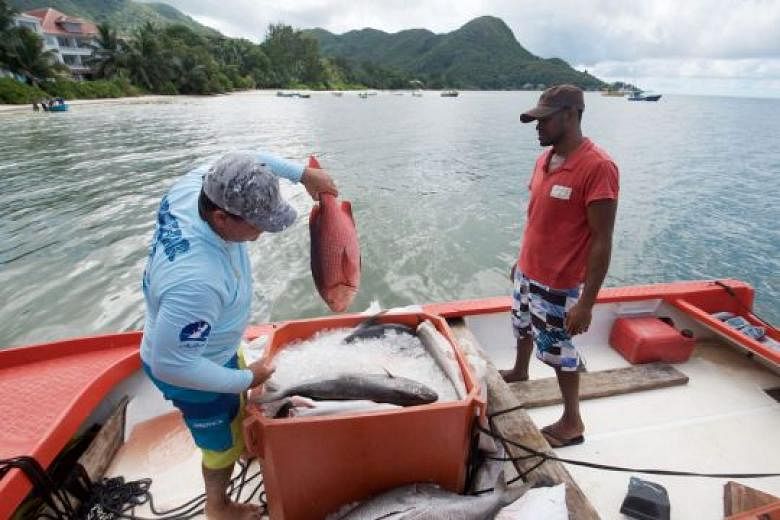VICTORIA • The island nation of Seychelles designated some of its fragile coastal areas for protection from commercial fishing, oil exploration and development this week, in return for a novel deal relieving it of part of its sovereign debt.
The Indian Ocean nation, rich in underwater reefs and postcard-perfect beaches, defaulted on its debt in 2008 and clawed its way back to prosperity with assistance from the International Monetary Fund.
Since then, government officials have been searching for ways to preserve Seychelles' environment without endangering financial stability. So the Finance Ministry was intrigued when United States-based conservation group The Nature Conservancy (TNC) approached it recently with a debt-for-nature financial proposal, the first in the world aimed at protecting a marine area.
The deep-pocketed conservation group offered to buy up nearly US$22 million (S$30 million) of Seychelles' outstanding US$406 million sovereign debt in return for the country designating a third of its marine area as "protected".
The conservation finance deal was designed by TNC and funded by public and private donors, including the Leonardo DiCaprio Foundation.
"This effort will help the people of Seychelles protect their ocean for future generations, and will serve as a model for future marine conservation projects worldwide," the Hollywood actor and conservationist said in a TNC statement on Wednesday.
The East African island nation of fewer than 100,000 people mainly relies on tourism and fishing for revenue, but in recent years, oil and gas companies have been exploring its turquoise waters, home to dugongs, turtle and tuna.
On Wednesday, Seychelles gave details on the first 210,000 sq km area to be conserved, limiting activities such as fishing, oil exploration and large-scale development in the most fragile habitats, while allowing them under certain conditions in the rest of the area. The remaining 200,000 sq km area, which will have different restrictions, will be announced later.
The Seychelles deal builds on 20 years' worth of similar debt-for-nature swops that have preserved vast tracts of tropical forests in Latin America and the Caribbean. But it is the first time the financing technique has been used to secure a marine environment, said Mr Rob Weary, head of NatureVest, which funds TNC's conservation deals.
"There has not been one example of a country defaulting on a debt-for-nature swop."
Mr Weary said the Seychelles deal - which will also help fund climate-change projects - could pave the way for other larger deals where conservationists buy a country's sovereign debt in return for policy changes designed to help the environment.
With an annual operating budget of US$650 million per year, TNC's funds dwarf many other better-known charities such as Oxfam or the World Wildlife Foundation.
"Never before has there been so much funds available to support marine-based economic activities, the conservation of coastal and marine biodiversity and adaptation to climate change," said Seychelles Vice-President Vincent Meriton when announcing the project.
Reaction to the announcement was generally positive. PetroSeychelles head Patrick Joseph told Reuters that no explorers had shown an interest in the protected areas, but that he was unsure that such stringent protection was necessary.
REUTERS


